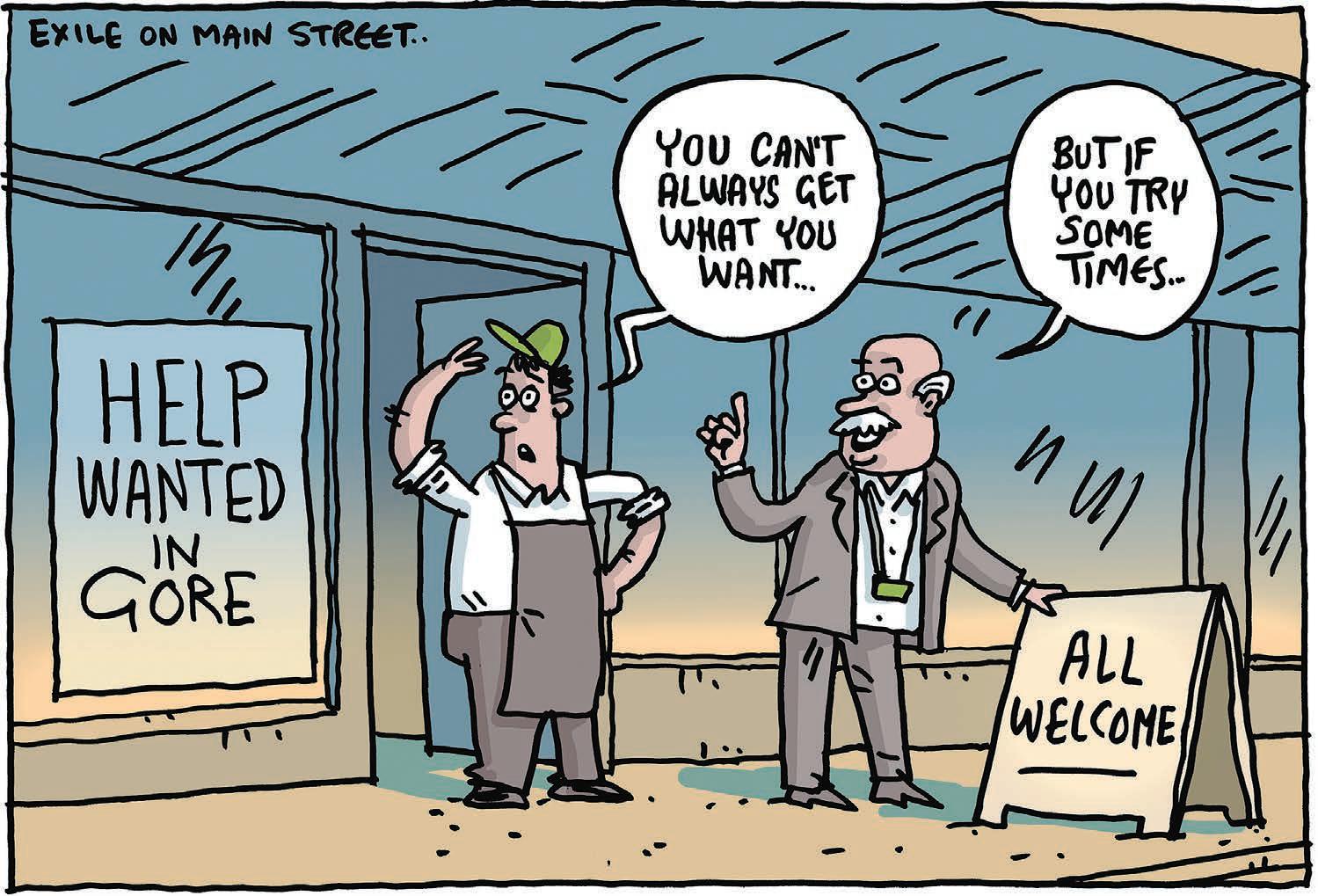
5 minute read
Editorial
Finding skilled labour a growing challenge
ATHOUSAND miles, eight degrees of latitude, and some deeply contrasting social differences are the gaps separating Gore in Southland from Opotiki in eastern Bay of Plenty.
Opotiki is wrestling with gangs, drug use and entrenched intergenerational unemployment.
Down south Gore is pedalling hard to keep locals local and to bring skilled labour into the strongly pastoral district.
But both rural communities appear to have the numbers against them when it comes to their working age populations’ growth.
An aging populace and departures for brighter lights by young people all threaten to eclipse the growth opportunities these communities aspire to, and can only meet by having a healthy strata of young working people in their midst.
For Opotiki the jobs for those workers are more plentiful than ever as the community turns to the sea for new farming opportunities, while also intensifying its land use into high value, labour intensive horticulture.
In Gore the continuing surge in red meat values has processors seeking highly skilled staff capable of extracting the most from every carcase, along with those skilled in other demanding aspects of the pastoral supply chain, from farming to truck driving.
But the mayors and officials of both districts are far from defeated by the negative predictions of demographers for their respective populations.
Meeting the local challenge with local solutions is helping stem the flow.
For school children who are tomorrow’s workers, efforts to get them familiar with the work Mum and/or Dad head off to do is becoming part of their learning experience, a steppingstone to getting them engaged in constructive work experiences, backed with an education more tailored to their district’s needs.
None of the people charged with keeping their districts working claimed the challenge is easy.
But all have a deep sense of commitment and passion for their districts’ future, one that eclipses any of the broad-brush policies passed out from Wellington.
Richard Rennie
LETTERS Assessing the blame for ecosystem decline
YOUR correspondent Laurie Collins (Farmers Weekly, May 9) found fault in Keith Woodford’s piece (Farmers Weekly, April 25) on pine trees in the landscape.
I noted that Woodford was a bit rusty with some of his botanical/ecological stuff but generally it was a sound article.
Collins got a bit confused about what mammals are and gaily likened them to birds of the past.
The only native land mammals here are bats and seals and I’ve yet to hear of them creating havoc in our high country.
What really rankles Collins is that the mammalian pests he wants to protect, such as deer, chamois and tahr, introduced by our British and European forefathers in the past 200 years, are the very animals his “Sporting Hunters” want to maintain, despite their impact on our native forest and alpine ecosystems.
Collins often cites the late Graeme Caughley, a university and forestry colleague of mine, who knew well that moa had a sometimes significant impact on our ecosystems but nowhere near as much as the big game mammals and smaller animals like rabbits, hares and possums that were introduced by the old Acclimatisation Societies.
Graeme and I worked in North Island ranges assessing plant and animal condition and presence and we kept in touch until his untimely death.
He was a thoughtful and modest man and would have been embarrassed by Collins’ presumptions about his work.
He moved to Australia because they had a much more interesting mammalian fauna and not to escape “the subjective pest dogma” that Collins claims.
For Collins’ interest I come from a family of botanists, foresters and hunters, two of whom were professional hunters.
David Field
Rotorua
Add pepper to pest control arsenal
REGARDING Steve WynHarris’ battle with his roof space rat (Farmers Weekly, May 2), there’s an easy way to keep rats out of hidden places in buildings. Give them a blast of ground pepper.
A year ago a rat took up residence under our built-in bath and after the pepper treatment he never returned. I used a metre length of 12mm clear plastic tubing and poured a shot of ground peppercorns into it. With one end of the tube fed into the rat’s lair and my air compressor into the other, a good blast of airspread pepper all through his hiding place.
Ground pepper is non-toxic and won’t cause any damage to your building. Once the rat has been forcibly evicted it buys some time to catch it in a trap. You can also get a good night’s sleep as well.
Neale Blaymires
Te Puke
Letters to the Editor
Letters must be no more than 450 words and submitted on the condition The New Zealand Farmers Weekly has the right to, and license third parties to, reproduce in electronic form and communicate these letters. Letters may also be edited for space and legal reasons. Names, addresses and phone numbers must be included. Letters with pen names will generally not be considered for publication.
Farmers Weekly is published by GlobalHQ, PO Box 529, Feilding 4740. New Zealand Phone: 0800 85 25 80 Website: www.farmersweekly.co.nz EDITOR Bryan Gibson bryan.gibson@globalhq.co.nz EDITORIAL Carmelita Mentor-Fredericks editorial@globalhq.co.nz Neal Wallace neal.wallace@globalhq.co.nz Colin Williscroft 06 323 1519

03 474 9240
027 298 6127 colin.williscroft@globalhq.co.nz Annette Scott 021 908 400
annette.scott@globalhq.co.nz Hugh Stringleman 09 432 8594 hugh.stringleman@globalhq.co.nz Gerald Piddock 027 486 8346 gerald.piddock@globalhq.co.nz Richard Rennie 07 552 6176 richard.rennie@globalhq.co.nz Nigel Stirling 021 136 5570 nigel.g.stirling@gmail.com PUBLISHER Dean Williamson 027 323 9407 dean.williamson@globalhq.co.nz ADVERTISING Andy Whitson 027 626 2269 New Media & Business Development Lead andy.whitson@globalhq.co.nz Steve McLaren 027 205 1456 Auckland/Northland Partnership Manager steve.mclaren@globalhq.co.nz Jody Anderson 027 474 6094 Waikato/Bay of Plenty Partnership Manager jody.anderson@globalhq.co.nz Donna Hirst 027 474 6095 Lower North Island/international Partnership Manager donna.hirst@globalhq.co.nz Grant Marshall 027 887 5568 South Island and AgriHQ Partnership Manager grant.marshall@globalhq.co.nz Javier Roca 06 323 0761 Livestock Partnership Manager 027 602 4925 livestock@globalhq.co.nz ISSN 2463-6002 (Print) ISSN 2463-6010 (Online) Debbie Brown 06 323 0765 Noticeboard/Word Only/Primary Pathways classifi eds@globalhq.co.nz Grant Marshall 027 887 5568 Real Estate Partnership Manager realestate@globalhq.co.nz Andrea Mansfi eld 027 446 6002 Salesforce director andrea.mansfi eld@globalhq.co.nz
PRODUCTION Lana Kieselbach 027 739 4295
production@globalhq.co.nz Advertising material adcopy@globalhq.co.nz









